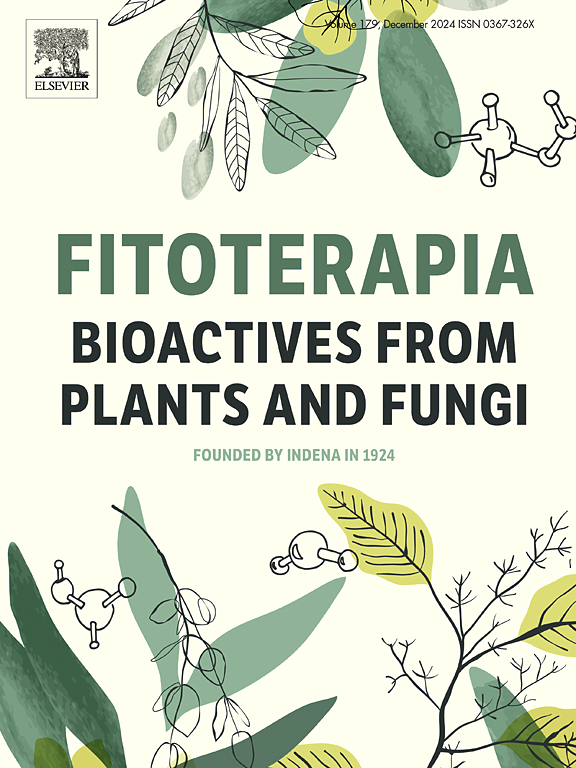Evaluation of anti-arthritic and anti-inflammatory potential of Ajugarin-I from Ajuga Bracteosa wall ex. Benth against Freund's complete adjuvant induced arthritis
IF 2.5
3区 医学
Q3 CHEMISTRY, MEDICINAL
引用次数: 0
Abstract
Rheumatoid arthritis (RA) is a prolonged autoimmune disease that targets the lining of small joints, causing inflammation and destruction of bone and cartilage. Anti-inflammatory drugs are available but offer short-term relief with adverse side effects. The present research was planned to study the in-vivo antiarthritic potential of ajugarin-I, sequestered from the Ajuga bracteosa. In-vivo studies include anti-inflammatory, analgesic, antidepressant, hematology profile, histopathological, radiological, and antioxidant analysis. The in-vivo results revealed that a high dose (HD, 60 mg/kg) of ajugarin-I significantly decreased the inflammatory paw edema (40 ± 0.04 %). Ajugarin-I also showed excellent analgesic behavior with 89 ± 0.55 % and 85 ± 0.55 % increments in pain threshold induced by cold and hot stimuli. Whereas ajugarin-I showed 95.1 ± 0.04 % antidepressant activity. Moreover, it showed strong antioxidant potential by raising the level of catalase, glutathione-S-transferase, and reducing glutathione while decreasing MDA levels in the liver, kidney, brain, paw, and spleen. Reduced serum levels of alanine transaminase (ALT), aspartate transaminase (AST), and alkaline phosphatase (ALP) (with 67.5 ± 3.53 %, 83.5 ± 3.53 % and 85 ± 7.07 % respectively), were observed with HD of ajugarin-I. Furthermore, its 60 mg/kg dose restored hematological abnormalities by raising the Hb level (85 ± 0.7 %) RBCs (91 ± 0.5 %), MCV (83 ± 2 %), platelet count (83 ± 0.5 %) and lowered the WBC (68 ± 0.35 %) level. Abnormalities in histoarchitecture of paw, liver, and kidney were curtailed by HD of ajugarin-I demonstrating its regenerative properties. Radiological analysis of the left hind paw showed that ajugarin-I lessened the inflammation in articular areas. These findings will guide a novel area of research for exploiting ajugarin-I as novel anti-arthritic and anti-inflammatory agent.

小苞草外壁小黄姜苷- 1抗Freund's完全佐剂性关节炎的抗炎和抗炎作用。
类风湿性关节炎(RA)是一种长期的自身免疫性疾病,以小关节的内壁为目标,导致炎症和骨骼和软骨的破坏。消炎药是可用的,但只能短期缓解不良副作用。本研究计划研究从小苞草中提取的牛膝姜苷- 1的体内抗关节炎潜力。体内研究包括抗炎、镇痛、抗抑郁、血液学、组织病理学、放射学和抗氧化分析。体内实验结果显示,高剂量(HD, 60 mg/kg)牛黄苷- 1显著降低炎性足跖水肿(40 ± 0.04 %)。冷热刺激诱导的疼痛阈值分别增加89 ± 0.55 %和85 ± 0.55 %,黄豆苷- 1也表现出良好的镇痛行为。黄黄素- 1的抗抑郁活性为95.1 ± 0.04 %。此外,通过提高过氧化氢酶、谷胱甘肽- s转移酶和谷胱甘肽的水平,降低肝、肾、脑、爪和脾脏的MDA水平,显示出较强的抗氧化潜力。降低血清丙氨酸转氨酶(ALT)、天冬氨酸转氨酶(AST)和碱性磷酸酶(ALP)(67.5 ±3.53 %, 83.5±3.53 %和85年 ±7.07 %),观察ajugarin-I高清。此外,其60 毫克/公斤剂量恢复血液异常通过提高Hb水平(85 ±0.7 %)红血球(91 ±0.5 %),公司(83 ±2 %),血小板计数(83 ±0.5 %)和降低白细胞(68 ±0.35 %)水平。牛黄素- 1的HD抑制了爪子、肝脏和肾脏组织结构的异常,显示了其再生特性。左后爪的放射学分析显示,牛黄素- 1减轻了关节部位的炎症。这些发现将为开发牛黄苷- 1作为新型抗关节炎和抗炎剂开辟一个新的研究领域。
本文章由计算机程序翻译,如有差异,请以英文原文为准。
求助全文
约1分钟内获得全文
求助全文
来源期刊

Fitoterapia
医学-药学
CiteScore
5.80
自引率
2.90%
发文量
198
审稿时长
1.5 months
期刊介绍:
Fitoterapia is a Journal dedicated to medicinal plants and to bioactive natural products of plant origin. It publishes original contributions in seven major areas:
1. Characterization of active ingredients of medicinal plants
2. Development of standardization method for bioactive plant extracts and natural products
3. Identification of bioactivity in plant extracts
4. Identification of targets and mechanism of activity of plant extracts
5. Production and genomic characterization of medicinal plants biomass
6. Chemistry and biochemistry of bioactive natural products of plant origin
7. Critical reviews of the historical, clinical and legal status of medicinal plants, and accounts on topical issues.
 求助内容:
求助内容: 应助结果提醒方式:
应助结果提醒方式:


